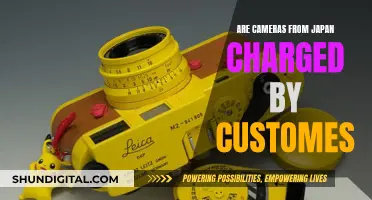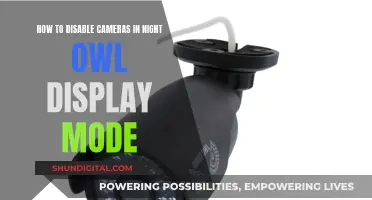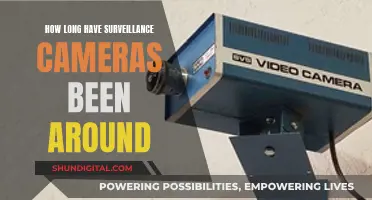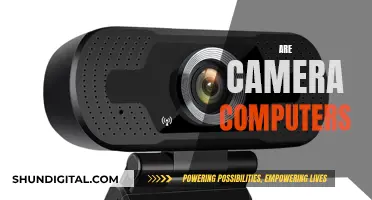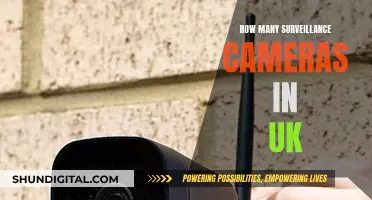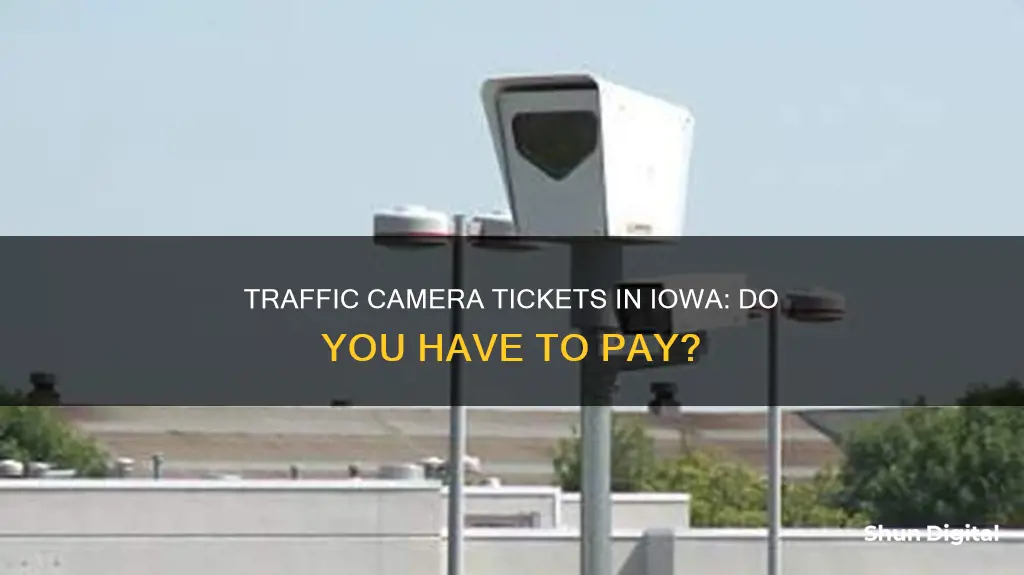
Traffic cameras are a divisive topic in Iowa, with some people viewing them as a necessary measure for traffic and speed control, while others consider them an invasion of privacy. While these cameras are intended to enhance road safety, many drivers are concerned about the potential consequences of being caught by one. One of the most pressing questions on people's minds is whether they are required to pay a traffic ticket issued by a camera.
| Characteristics | Values |
|---|---|
| Do you have to pay traffic camera tickets in Iowa? | Yes, but they are civil infractions, not Iowa Traffic Code Violations, so your insurance should not be affected. |
| How much are fines for speeding violations? | $75 for 11-20 mph over the limit, $100 for 21-25 mph, $250 for 26-30 mph, $500 for 30+ mph. Fines are doubled in work zones. |
| How do you pay a traffic ticket? | All traffic tickets are paid through the Iowa Courts website. |
| How quickly do you need to pay? | It's important to pay quickly to avoid additional fees or losing your license. |
| What happens if you don't pay? | A civil lien can be placed against your license plates, and the penalty will need to be paid when you renew your registration. |
| Are there any new regulations for traffic cameras in Iowa? | Yes, Gov. Kim Reynolds signed a law in May 2024 that limits how and when cities and counties can use traffic cameras to issue tickets and standardizes fines. |
What You'll Learn

Traffic camera tickets are municipal infractions
If you choose not to pay a traffic camera ticket, there can be consequences. The city can place a civil lien against your license plates, so when you try to renew your registration, you will have to pay the penalty. There are several civil remedies available to the city to collect the fine. The ticket is usually cheaper than a regular traffic ticket, and your insurance company will not be notified.
Each state has different traffic laws, and while running a red light or stop sign is illegal everywhere, the use of cameras to enforce these laws varies. Some states ban automated traffic cameras, while others allow local governments to set up their own camera programs. Some states do not address the use of red light and speed cameras at all, and some process automated traffic tickets the same way as a non-moving violation or parking ticket. It's important to understand your local laws and whether your route might use traffic safety cameras.
If you receive a traffic ticket, it is important to pay it quickly to avoid additional fees or losing your license. You can pay your ticket online through the Iowa Courts website, but it may take 2-3 weeks for your ticket to show up in the system. You will need information from your ticket to pay it online, and you can search for your ticket by name or case number.
Computer Camera: Always On or Not?
You may want to see also

Fines for speeding violations
In Iowa, traffic cameras are used to monitor and control traffic and speed. While a speeding camera citation is not an Iowa Traffic Code Violation, it is a civil code (municipal/city ordinance) infraction. If you do not pay the fine within the specified timeframe (usually 90-120 days), it will not affect your DOT record or driver's license. However, failing to pay the fine can result in a civil lien against your license plates, impacting your ability to renew your registration.
Now, let's discuss the fines for speeding violations in detail. The penalties for speeding violations vary depending on the location and the severity of the offence. Here are some common scenarios and their associated fines:
- Basic speeding law violation: This applies when a driver exceeds a safe speed considering the current road, traffic, and weather conditions. Fines for this type of violation can vary. For example, in Oregon, the presumptive fine for speeding 1 to 10 miles per hour over the limit is $115. The fine increases to $165 for speeding 11 to 20 miles per hour over the limit and $265 for 21 to 30 miles per hour over the limit.
- Absolute speed limit violation: This refers to driving above the maximum speed limit posted for a particular roadway. Again, using Oregon as an example, the presumptive fine for speeding 1 to 10 miles per hour over the absolute limit is $115. The fine increases to $165 for 11 to 20 miles per hour over the limit and $265 for 21 to 30 miles per hour over. If a driver exceeds the limit by more than 30 miles per hour, the presumptive fine jumps to $440.
- Speed camera violation: When caught speeding by a speed camera, you will typically receive a Notice of Intended Prosecution (NIP). You must respond to this notice within a specified timeframe, usually around 14 days, by providing information about who was driving the car. Ignoring this notice can lead to further legal consequences, including a court summons. After responding to the NIP, you will receive either a Fixed Penalty Notice (FPN) or a letter informing you of your court date. The FPN typically includes a fine and penalty points on your license. In the UK, for instance, the minimum penalty for speeding is a £100 fine and 3 penalty points.
- Police-issued speeding violation: When pulled over by the police for speeding, they have the discretion to issue a verbal warning, an FPN, or a court summons. Similar to a speed camera violation, the FPN will include a fine and penalty points. In the UK, drivers may also be offered the option to attend a speed awareness course instead of paying the fine and receiving points.
It's important to note that the specific fines and penalties for speeding violations can vary from state to state and country to country. Additionally, repeat offences or speeding in specific zones, such as construction or school zones, may result in higher fines and more severe penalties.
Surveillance Cameras: Do They Really Need a Requiem?
You may want to see also

Contesting a traffic camera ticket
Review Your Ticket
First, check your ticket for accuracy. Ensure all the information is correct, including your personal information and vehicle description. While minor discrepancies may not be grounds for dismissal, significant errors might be. For instance, if you drive a black BMW and the ticket describes a red Honda Civic, this could be grounds for dismissal.
Also, make note of the exact code sections you're cited for violating. Understand the specific traffic laws you allegedly broke, as this will help you build your defence.
Gather Evidence
Record all relevant details from the scene of the incident, including the time of day, location, weather conditions, traffic volume, and how long you were detained. Take pictures of the area from your perspective and the perspective of the traffic camera. If your case depends on an obstruction or hazardous condition, be sure to photograph it. For example, if you swerved to avoid a pothole and were cited for an illegal lane change, photos of the pothole would support your argument.
If there were any eyewitnesses, take their statements and contact information. Passengers or bystanders who can corroborate your version of events can help convince the judge that the traffic camera's observations were inaccurate.
Assess Your Defence
Determine whether you can argue that your actions were due to a mistaken interpretation of the facts. For example, if you didn't stop at a crosswalk because the paint was faded and you didn't see it, a judge might be lenient. However, arguing that you didn't know you were supposed to stop at a crosswalk is unlikely to help.
Decide if your actions were legally justified or necessary to avoid harm. Even if you technically violated a traffic ordinance, you may have had to make an illegal manoeuvre to avoid a more dangerous situation. For instance, if you swerved to avoid hitting an animal, you might be able to get a ticket for an illegal lane change dismissed, especially if you have eyewitnesses who can confirm your version of events.
Analyse the code sections you were cited for violating. Look for subjective elements that involve personal judgment, such as whether your actions were "safe" or "responsible." You can challenge the camera's objective conclusion by presenting evidence that, from your perspective, your actions were justified.
Present Your Defence
If your case goes to court, dress professionally and arrive early. Treat court staff with respect and address the judge as "Your Honour." Present your defence succinctly and stick to the facts. If you've brought witnesses, keep your questions brief and focused on what you're trying to prove.
You can challenge the camera's observations by presenting contradictory evidence, such as photos or eyewitness statements. If your ticket was issued based on information from a specific device, such as a radar gun, you can request maintenance records to verify that the equipment was functioning properly. If the device wasn't calibrated or maintained according to industry standards, you may be able to get your ticket dismissed.
Updating Your Camera Raw D500: A Step-by-Step Guide
You may want to see also

New regulations for traffic cameras
The use of traffic cameras to enforce road safety is a highly controversial topic in Iowa and across the United States. While some states have banned automated traffic cameras, others have implemented regulations to control their use.
In Iowa, Governor Kim Reynolds has signed a new law, House File 2681, which places limits on how and when cities and counties can use traffic cameras to issue tickets. This law also standardizes the fines that drivers can receive. Here are the key new regulations:
- Cities and counties must obtain a permit from the Iowa Department of Transportation to install traffic enforcement cameras. They must provide a written justification, including records of traffic violations, collision severity, speed data, and alternative methods considered to improve public safety.
- Traffic cameras can only issue tickets when a driver exceeds the speed limit by more than 10 miles per hour.
- Communities with a population of 20,000 or fewer cannot issue tickets from their cameras but can still give warnings.
- Local governments must place signs at a distance of 500 to 1,000 feet before any traffic cameras, notifying drivers of their presence.
- Drivers who receive tickets can provide evidence if they were not driving, but they must provide the name and address of the person who was driving.
- Photos of license plates must be deleted within 30 days unless they are part of an ongoing criminal investigation.
- Communities must submit annual reports to the Department of Transportation, detailing collision and citation data at camera locations.
- Fines for speeding violations are standardized: $75 for 11-20 mph over the limit, $100 for 21-25 mph, $250 for 26-30 mph, and $500 for over 30 mph. These fines double in work zones.
Unleashing Your Camera's RAW Potential: A Guide
You may want to see also

Traffic camera tickets and insurance
Traffic camera tickets are a frustrating but increasingly common part of driving. If you've been caught speeding or running a red light by a camera, you may be wondering how this will affect your insurance. The good news is that, in most states, these types of tickets are treated as non-moving violations, similar to a parking ticket or a broken tail light. This means they won't impact your insurance rates. However, there are a few exceptions to this rule, so it's important to be aware of the specific laws in your state.
In Iowa, for example, a speed camera citation is considered a civil code or municipal/city ordinance infraction rather than a traffic code violation. This means that it won't go against your driving record and your insurance company won't be any wiser. However, you may still have to pay a fine, and the city can come after you if you don't. While it won't impact your insurance, it's important to take these tickets seriously and deal with them promptly.
In other states, the consequences of a traffic camera ticket can be more severe. In Arizona, California, and Oregon, for instance, a red light camera ticket is considered a moving violation and can result in points being added to your driver's license. This, in turn, can lead to higher insurance rates. It's worth noting that these states are in the minority, and even if your rates do go up, you can always shop around for a better deal from an insurer that doesn't penalize you for photo tickets.
So, what should you do if you receive a traffic camera ticket? Well, firstly, don't ignore it. While it might be tempting to throw it in the trash, this could result in further penalties down the line. Instead, you have a few options. You can pay the fine, request a trial to plead not guilty, or plead guilty and ask for more time to pay. If you choose to fight the ticket, make sure there's proof of the violation and be prepared to explain your reasons for breaking the law.
While it's a relief that traffic camera tickets usually won't affect your insurance, it's important to remember that safe driving practices are crucial to keeping yourself and others safe on the road. So, even if you're running late, it's always better to obey the speed limit and wait for the green light.
Traffic Camera Tickets: Insurance Impact and You
You may want to see also
Frequently asked questions
Yes, you do. While it is a civil infraction and not an Iowa Traffic Code Violation, you still have to pay the fine.
If you do not pay the fine in time, a civil lien can be placed against your license plates, which will catch up to you when you try to renew your registration.
The fines for speeding violations are: $75 for 11-20 mph over the limit, $100 for 21-25 mph, $250 for 26-30 mph, and $500 for over 30 mph.
You can pay your ticket by phone, mail, in-person, or online. To pay online, go to the Iowa Courts website, select "Pay Fines Online", and fill in the required information.
If you believe you were wrongfully ticketed, you can contest the citation by submitting an "Administrative Review Request Form".


